- Home
- Harlan Ellison
Pulling A Train
Pulling A Train Read online
PULLING A TRAIN
(a very young)
Harlan Ellison®
author of “Sex Gang”
writing as Paul Merchant
An Edgeworks Abbey Offering
in association with
kicks books
new york, new york
PULLING A TRAIN
A very young HARLAN ELLISON®
[Author of SEX GANG (Part One) writing as:
“Paul Merchant” and other noms de plume]
PULLING A TRAIN is an original Edgeworks Abbey® offering in association with Kicks Books.
Published by arrangement with the Author and The Kilimanjaro Corporation.
PULLING A TRAIN
by HARLAN ELLISON®
This edition is copyright © 2012
by The Kilimanjaro Corporation.
All rights reserved.
Harlan Ellison and Edgeworks Abbey are registered trademarks of The Kilimanjaro Corporation.
No part of this book may be reproduced or transmitted in any form or by any means electronic or mechanical—including photocopy, recording, Internet posting, electronic bulletin board—or any other information storage and retrieval system, without permission in writing from the Author, except by a reviewer who may quote brief passages in a critical article or review to be printed in a magazine or newspaper, or electronically transmitted on radio, television, or in a recognized on-line journal. For information address Author’s agent: Richard Curtis Associates, Inc., 171 East 74th Street, New York,
New York 10021, USA.
All persons, places, and organizations in this book—except those clearly in the public domain—are fictitious and any resemblance that may seem to exist to actual persons, places or organizations living, dead or defunct is purely coincidental. These are works of fiction.
Harlan Ellison websites:
www.harlanellison.com and www.HarlanBooks.com
For more signed and personalized Harlan Ellison books:
c/o HERC: Post Office Box 55548, Sherman Oaks, California 91413
Published in 2012 by Kicks Books
PO Box 646 Cooper Station
New York NY 10276
Printed in the United States of America
ISBN: 978-0-9659777-5-3
Editor: Miriam Linna
Design: Pat Broderick/Rotodesign
Front cover painting: Les Toil
www.kicksbooks.com
This one, if only he were here
to see it, and know how
much love and admiration
prompts it:
to the memory of
ROBERT CULP
Bobby. Demon. Glass Hand. Friend.
GARDYLOO!
Traditionally, usually, conventionally, thisposition in the front matter of a book is sitefor a list of the author’s other books, majortitles, films, et al. To find such a chronology, from #1 through about #90, for Ellison… please hie thee to Pages 150-155. There is only a finite amount of space in the known universe. You may consider pp. 150-155 the variorum listing, and ever so accurate.
Copyright Notices and Acknowledgments:
Introduction: “Inescapable Cemeteries,”
by Harlan Ellison, copyright © 2012
by The Kilimanjaro Corporation.
“Sex Gang” (as by “Paul Merchant”), copyright
© 1959 by Harlan Ellison. Renewed, 1987 by
The Kilimanjaro Corporation.
“Nedra at ƒ: 5.6,” copyright © 1956 by Harlan Ellison.
Renewed, 1984 by The Kilimanjaro Corporation.
“The Bohemia of Arthur Archer” (as by “Cordwainer Bird”), copyright © 1956 by Harlan Ellison. Renewed, 1984 by The Kilimanjaro Corporation.
“Jeanie with the Bedroom Eyes,” copyright
© 1956 by Harlan Ellison. Renewed, 1984
by The Kilimanjaro Corporation.
“Both Ends of the Candle,” copyright © 1956
by Harlan Ellison. Renewed, 1984 by
The Kilimanjaro Corporation.
“A Girl Named Poison” (as by “Jay Solo”),
copyright © 1963 by Harlan Ellison.
Renewed, 1991 by The Kilimanjaro Corporation.
contents
Foreword
Introduction: INESCAPABLE CEMETERIES
SEX GANG (as by “Paul Merchant”)
NEDRA AT ƒ:5.6
THE BOHEMIA OF ARTHUR ARCHER
(as by “Cordwainer Bird”)
JEANIE WITH THE BEDROOM EYES
BOTH ENDS OF THE CANDLE
A GIRL NAMED POISON
(as by “Jay Solo”)
Foreword
A WORD FROM THE PUBLISHER
by Miriam Linna
Harlan Ellison is the most effective genre-buster in captivity today. He barged into the literary world fifty-plus years ago by grabbing the flaming tail of juvenile delinquent fiction and dragging its bloody boots into the back room of the clubhouse for a switchblade hazing by a new breed of brassiere busting blue jean debutantes, hellbent for leather. He'd learned the JD stance during his service as war counselor in Red Hook’s chain-swinging Barons, knew the real deal. It made Blackboard Jungle read like a gardening manual. The year was 1959. This was not the same old fluffernutter.
PULLING A TRAIN is our first collection of iconic early adult fiction by Harlan Ellison, written, as he likes to tell it, “for the buck,” paying for room and board between sales to “real” magazines. The short stories herein have not seen print in generations. When they were in circulation, in assorted he-man publications back in the day, they bore mysterious bylines like Cordwainer Bird, Ellis Hart, Jay Solo, Derry Tiger, Price Curtis, and Paul Merchant. For the collector quotient, Lustful One appears herein as the glorious Nedra at ƒ:5.6 complete with potently pertinent mod age adlibs. These tales were hot. Brown paper wrapper hot. Hot enough to raise your hackles, and other things. They were street tough like the prime-cut JD shorts he was turning in to crime and mystery magazines during the same period, but crude and menacing beyond curative measures.
Ellison did to popular American fiction what Elvis Presley did to popular American music—he knocked it upside the head, so hard that the old gray matter was never ever quite the same again.
Out of print and off the radar for fifty years, these tales fairly levitate off the page with attitude to spare. Bad attitude.
Take it away, Cheech Beldone. Stag Preston awaits.
-—Miriam Linna, editor
Bad Seed Magazine/Kicks Books
Brooklyn NY
Introduction
Harlan Ellison
INESCAPABLE CEMETERIES
If you pondered for a billion years, you could never appreciate how odd, how eerie, how unsettling it is for me to be writing an introduction to this first of two books never intended to see the light of day.
Doctors are lucky. Their fuckups get buried under headstones.
In literary circles there’s an often-told legend. Don’t know if it’s true, or apocryphal, or just bullshit. But it goes like this: Ernest Hemingway, on the ship coming back from France, he having finished his first novel, before 1926’s THE SUN ALSO RISES, was so disgusted and miserable at what he had set down, that he tossed it over the rail, into the Atlantic Ocean, no trace or snippet of the manuscript of that novel remaining extant. We have only this legend. He buried what he considered a Frankensteinian misfit, and went on to glory.
I am Hemingway at the ship’s railing, and my youthful indiscretions have risen from the deep, have ascended to print, and if you sat on a dune in the Gobi for a billion years, you could not know how discomfiting it is to be writing this introduction.
And so we halt our carriage of time fifty-two years later. Our carriage once known as S
EX GANG, now two volumes titled PULLING A TRAIN and GETTING IN THE WIND. I was twenty-five years old. Fresh out of two grueling years in the US Army, having been drafted after being thrown out of college, after having married—having married badly, but only half brain-dead aware of it at the time—and I was working as an editor for a men’s magazine, the #2 slick men’s mag in the game at that point. And on the side, I was not only writing day and night, and trying to unmire myself from the abattoir that had been my first youthful marriage, but I was creating, for a man I had come to despise, a man who casually battened on making people think he was all-powerful, I was creating a line of cheap mildly-titillating pseudo-erotic paperbacks. If you were reading in the Fifties, FOREVER AMBER had to be read under your bedcovers with a flashlight. LADY CHATTERLEY’S LOVER was being smuggled into the United States in the French-published Olympia Press paperback editions from Maurice Girodias in the way one smuggles true ivory horn today. William Burroughs was completely off the charts. So were Alexander Trocchi (writing as “Frances Lengel”), Iris Owens (writing as “Harriet Daimler”), and Henry Miller. And FANNY HILL! Well, only depraved sado-masochists could get hold of an underground printing. School kids still read those little Tijuana Bibles, the eight page mini-comics featuring Joe Palooka with a dick the size of a schooner’s mast, or Toots ’n’ Casper in Porno Paree. And I created, lock stock and cover blurbs, a line of paperbacks for this odious person I came to loathe, a line called Nightstand Books; and they made him millions.
That’s what I was doing at age twenty-five.
I was doing it for the buck. The guy I was working for was—in my constitutionally-protected opinion—a stone son of a bitch. I don’t think he really liked writers, or trusted them: I think he conceived of writing as something other than “honest labor.” But I made millions for him, so he put up with me. The mental anguish was just lagniappe.
The first time this book—now two books—was published, in 1959, as a slim, cheesy paperback collection, the name of the author was “Paul Merchant,” the pseudonym I’d conceived to hide my perfidious activities. Originally, I wanted it to be “D.S. Merchant,” the D.S. standing for “Dirty Smut.” But the publisher got onto it and, somehow, “Paul” came into existence.
This time, the book is twice as long as the original, sort of like a freight train pulling a double load of flatcars and boxcars with the addition of more than a few stories from the same time-period that I think are pretty good. But then, what the hell do I know; I’m the yotz who wrote all of it. These are sort of new old stories. Pulling a loaded train.
But let me get to the title. I know you’re dying to hear my twisted reasoning for putting such a bad taste politically-putrescent moniker on a modern paperback. Apart, that is, from just being an annoying guy.
When I was a kid, it was another kind of world, just at the end of the Great Depression, and there were thousands of younkers like me: On the road. Sleeping under railroad trestles, sharing gypsy coffee out of a tin can with “gentlemen of the road,” hobos, and we called each other brother—or just ’bo. And when I’d manage to jump aboard an empty boxcar, it might be pulling a double, treble load. They were called clankers. But the phrase “pulling a train”—even though it started with riding the rails—came to mean something a lot less commonplace.
Hauling the freight, a double load, like SEX GANG, which is now a double-load of two books, got picked up by the street, and in the joint. Using it as a book title is merely a demonstration of my demented sense of what is black, dark, ugly humor. It is a tough title for what is supposed to be a book of tough stories written during a tough time.
“Pulling a train” is obscene.
When I first suggested putting it on this book, my wife told me she’d leave me. So I backed off fast, because I adore her, and I was going to call it, instead, DOING IT FOR THE BUCK.
Yeah, I know what the odious phrase means. It’s old-time on-the-road syntax, outta the street and still being used in the slam by the lowest scum you can imagine. It’s gangster slang from the 1920s, decades before “gangsta” was even conjured up by punks who are so stupid they think holding a .38 Police Positive sidewise is “cool.” It came from a period when men treated women like “broads” or “gashes.” I’ve heard hobos and cons and street thugs in packs use it since the 1940s. When it insanely came as a viable title for this book, my gorge became buoyant.
But I kept coming back to it.
Do not ask me why. Call it bad taste. Call it obsession. But PULLING A TRAIN of a double-load of stories is what it is, and I must admit, as Monty Python put it, “It’s a fair cop.”
Sometimes in this life, there is no more truthful reply to Why Did You Do Such a Questionable Thing? than the helpless, “It seemed like a good idea at the time.” That’s what Napoleon said when someone asked him why he was ass enough to attack Russia in the killing winter. He shrugged, said, “I dunno; seemed like a good idea at the time.”
These stories—which seemed, each one, like a good idea at the time—assayed across a lifetime of learning to do the job correctly, leaving some sort of decent literary footprint, seem to me now technically crude, written early on, written for the buck, to learn my craft on the job. I am a self-made man, thereby demonstrating the horrors of Unskilled Labor. I wanted to eat. So sue me.
Thus, I suppose my reason for the title is that they’re the work of a tyro, and need not be enhanced by some extravagantly fatuous title. Old GI speak, biker phraseology, more than a touch gross. I reveal my roots. My wife, my Electric Baby honey, well, she let me have my way but she insists I should have my mouth washed out with a big bar of Fels-Naptha.
But since the destruction of the past and all its cues and clues has been effectively lost due to tv and the internet, most folks wouldn’t even have figured out the reference, and only a handful, as weird as I, probably, will now “get it.”
Considering the bulk of the shit that was nominated for Oscars and Golden Globes this year, hell, my title is as pristine as faerie dust.
Compared to what is “fit for consumption” these days, this book is baldly as it was intended: harmless. Back in 1959 it was lumped with “pornography,” the devil’s handmaiden, a vile tome guaranteed to blacken children’s souls. Ten years later it was just silly pseudo- and updated-Victorian blue. No more infectious than THE PEARL. (Another obscure literary reference.)
Look, let’s get something straight from the git-go. I got tossed out of college after a year and a half. I had the lowest average in the history of Ohio State University, at which institution one can only get such horrendous marks if one misses the game-winning pass. No student, I.
So this book comes to you with all its banners of youthful arrogance, inexperience, and indiscretion billowing in the breeze. It was written, piece by piece, by a smartass wannabe at the very beginning of what miraculously turned out to be a very long career. But when they were written, they were written fast, and by someone learning his trade. On-the-job training sounds noble, but often it’s more mish-mosh than majesty.
No point in apologizing for the stupid errors and breaks in mature prose: They weren’t written by a master craftsman, they were written by a kid trying to learn his trade, working for, well, the buck. Just like all of you.
...
So, there was this guy who wanted to get on Playboy’s gravy train, and he’d started a lesser imitation of Playboy. He needed to build an editorial staff. He thought of me. I took the job.
Went to Chicago. Actually, a suburb of Chicago.
Worked for him for a year, and around that time newsstands started selling what would now be called “soft-porn erotica,” paperbacks with silly titles like SATAN’S SEX SLAVES and SIN WAS HER MIDDLE NAME and suchlike. Very, very tame crap, for its time…not to mention the present-day mode of Anything Goes. This was modern-day FANNY HILL sidewise “sex-stuff.”
So this guy, of whom I speak, for whom I was working, asked me if I could cobble up a similar series of paperbacks.
> Not only could I…I was better at it than those who preceded me.
If I recall correctly, this much later, the first of these (now referred to as) “sleaze” (or, sometimes “zilch”) paperbacks were from imprimaturs such as Beacon Books, Bedside Books, Midwood, and on and on. Come to think of it, as long as I’m “being real” with you here, I think calling these books “sleaze” is a fucking insulting putdown word by plugged-up asshole academics and NY Times bestseller-list snobs feel way above their station. Fuck ’em, and the sleaze they rode in on, that’s what I say, from my unassailable, literary nabob pinnacle, never forgetting my roots…as I wish they might remember theirs.
One-handed reading material, intended to keep truck drivers entertained in roadside toilets. In the trade we called them “stiffeners.”
Today, they’d be laughed out of the room, so florid and so innocent were they. But at the time, oh, they were hot. Then: undercover; today: underwhelming.
And so I created, for a guy I hated, a line called Nightstand Books. I devised plots, developed the formats, designed the cover art and sent everything off to the sadly overworked, underpaid slave-minions at the Scott Meredith Literary Agency in New York, who got a monthly fee for hiring brilliant (but overworked, underpaid) writers who, under their real names were writing some of the best trend-setting novels of their time. This was a fast fifteen hundred bucks for maybe a week’s work. It was, as for me, lagniappe. It was for the buck. Creative minions. All of us. I did all the scut work, too: I made up the title, designed and wrote all the blurb copy, did the proofing and copyediting, and put out—to start—something like two or four a month. Went up to six a month very quickly. They took me about three days to put all four together, and they were written for a grand or a grand and a half by some of the best mystery and science fiction writers of the day…under pseudonyms.

 Repent, Harlequin! Said the Ticktockman
Repent, Harlequin! Said the Ticktockman Broken Glass
Broken Glass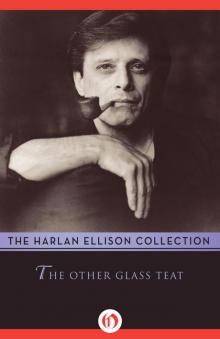 Other Glass Teat
Other Glass Teat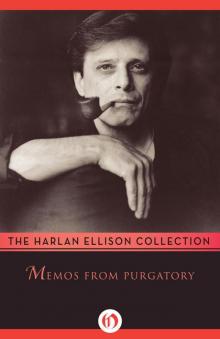 Memos From Purgatory
Memos From Purgatory I Have No Mouth and I Must Scream
I Have No Mouth and I Must Scream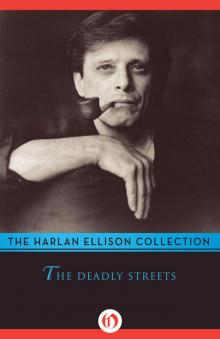 The Deadly Streets
The Deadly Streets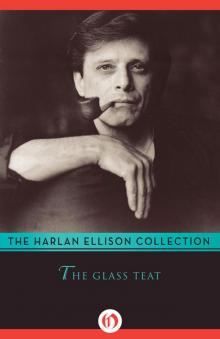 The Glass Teat
The Glass Teat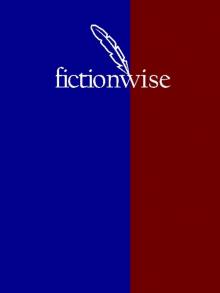 Paingod and Other Delusions
Paingod and Other Delusions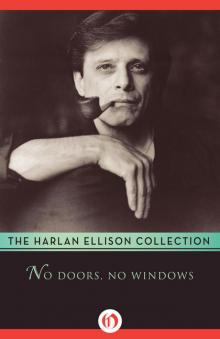 No Doors No Windows
No Doors No Windows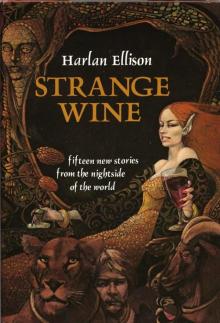 Strange Wine
Strange Wine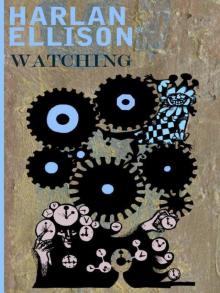 Harlan Ellison's Watching
Harlan Ellison's Watching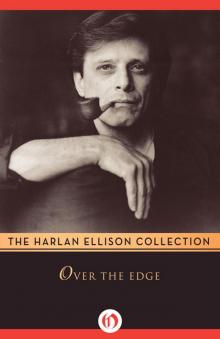 Over the Edge/An Edge in My Voice
Over the Edge/An Edge in My Voice Troublemakers: Stories by Harlan Ellison
Troublemakers: Stories by Harlan Ellison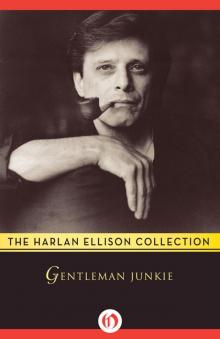 Gentleman Junkie and Other Stories of the Hung-Up Generation
Gentleman Junkie and Other Stories of the Hung-Up Generation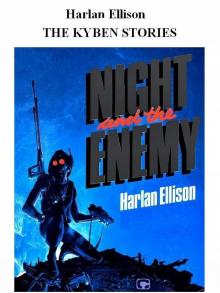 The Kyben Stories
The Kyben Stories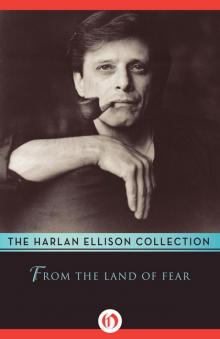 From the Land of Fear
From the Land of Fear The Top of the Volcano: The Award-Winning Stories of Harlan Ellison
The Top of the Volcano: The Award-Winning Stories of Harlan Ellison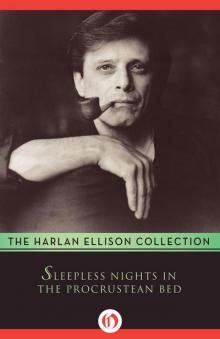 Sleepless Nights in the Procrustean Bed
Sleepless Nights in the Procrustean Bed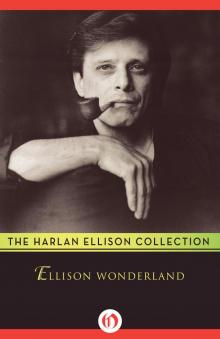 Ellison Wonderland
Ellison Wonderland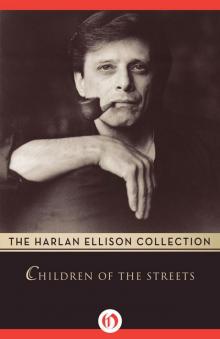 Children of the Streets
Children of the Streets Can & Can'tankerous
Can & Can'tankerous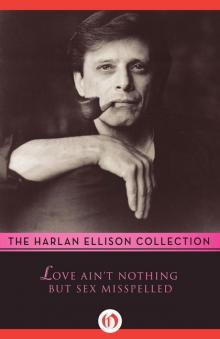 Love Ain't Nothing but Sex Misspelled
Love Ain't Nothing but Sex Misspelled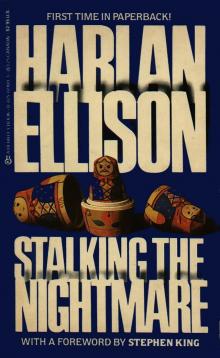 Stalking the Nightmare
Stalking the Nightmare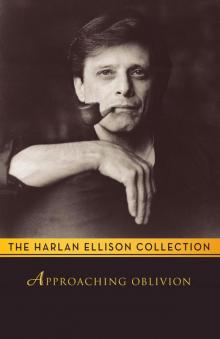 Approaching Oblivion
Approaching Oblivion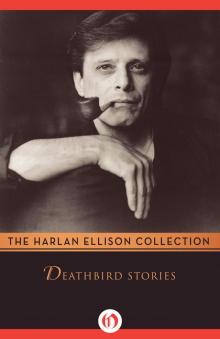 Deathbird Stories
Deathbird Stories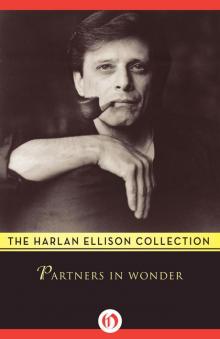 Partners in Wonder
Partners in Wonder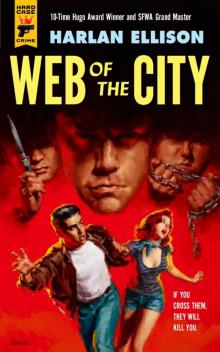 Web of the City
Web of the City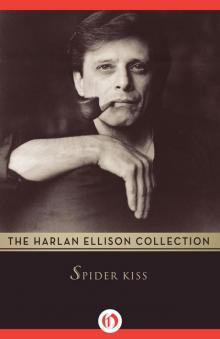 Spider Kiss
Spider Kiss A Boy and His Dog
A Boy and His Dog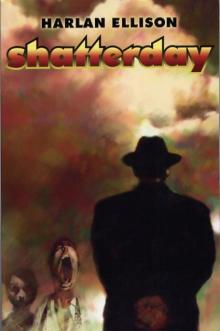 Shatterday
Shatterday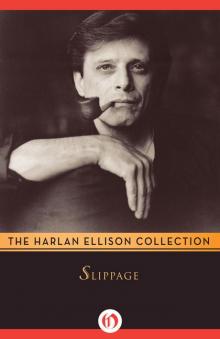 Slippage: Previously Uncollected, Precariously Poised Stories
Slippage: Previously Uncollected, Precariously Poised Stories Repent, Harlequin! Said the Ticktockman
Repent, Harlequin! Said the Ticktockman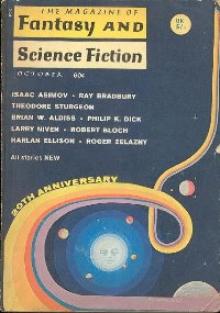 Come to Me Not in Winter's White
Come to Me Not in Winter's White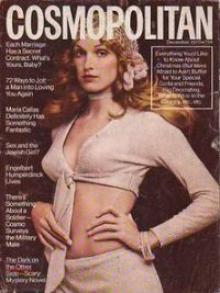 The Song the Zombie Sang
The Song the Zombie Sang The Other Glass Teat
The Other Glass Teat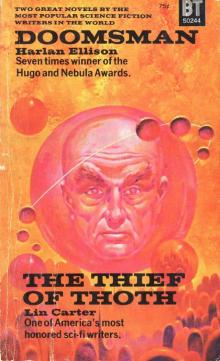 Doomsman - the Theif of Thoth
Doomsman - the Theif of Thoth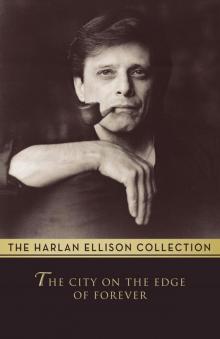 The City on the Edge of Forever
The City on the Edge of Forever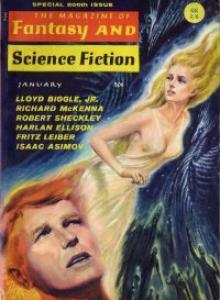 I See a Man Sitting on a Chair, and the Chair Is Biting His Leg
I See a Man Sitting on a Chair, and the Chair Is Biting His Leg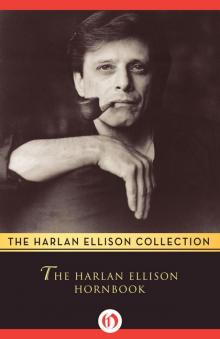 The Harlan Ellison Hornbook
The Harlan Ellison Hornbook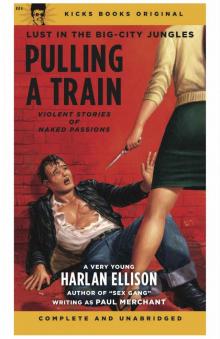 Pulling A Train
Pulling A Train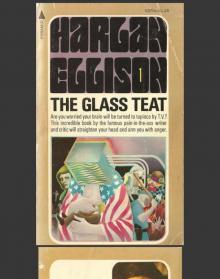 The Glass Teat - essays of opinion on the subject of television
The Glass Teat - essays of opinion on the subject of television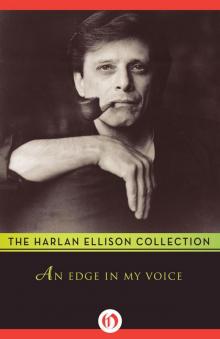 An Edge in My Voice
An Edge in My Voice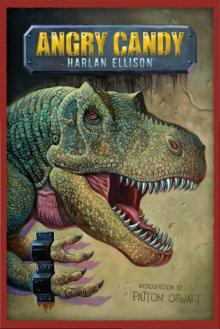 Angry Candy
Angry Candy Troublemakers
Troublemakers The Top of the Volcano
The Top of the Volcano Over the Edge
Over the Edge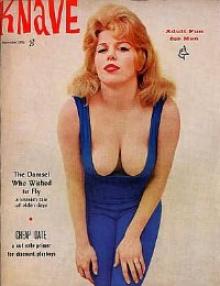 Survivor #1
Survivor #1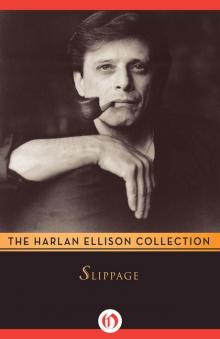 Slippage
Slippage